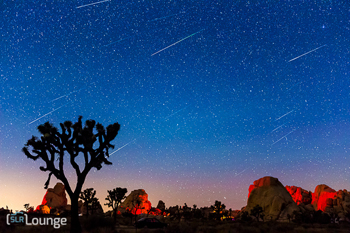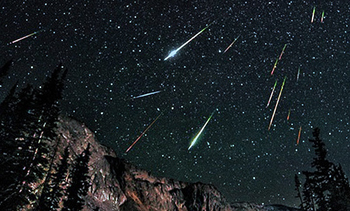For Sunday September 13, 2015
Lectionary Readings (Revised Common Lectionary, Year B)
Proverbs 1:20–33 or Isaiah 50:4–9
Psalm 19 or Wisdom of Solomon 7:26–8:1 or Psalm 116:1–9
James 3:1–12
Mark 8:27–38
The Perseid meteor shower last month, dubbed the "Fireball Champion" by NASA for its hundred shooting stars per hour, is an annual reminder of our fascination with the heavens. My neighbor even made a special trip to an island for maximum viewing pleasure.
Some years ago, my wife and I visited Stonehenge, where 5,000 years ago architect-astronomers hoisted massive boulders into a circle based upon their knowledge, before they ever started construction, of the summer solstice, and of how the sun's rays would strike their site at a precise time and place.
About that same time, star-gazers in Egypt noticed how one morning every year, just before the Nile flooded, Sirius lined up with the sunrise, and so they designated that day the first day of their calendar year.
I still remember a chilly October night in remote Siberia near Lake Baikal, and an evening on the outskirts of Nairobi, when the ink-black sky was so clogged with blazing stars that I felt like I could reach up and touch them.
So, I resonate with the psalmist for this week: "The heavens declare the glory of God; the skies proclaim the work of his hands. Day after day they pour forth speech; night after night they display knowledge."
But not everyone draws such pious conclusions from the "book of nature." In her book The Sacred Depths of Nature, the cell biologist Ursula Goodenough recalls a camping trip when she was about twenty years old.
 |
|
August 10, 2015
|
She writes, "I found myself in a sleeping bag looking up into the crisp Colorado night. Before I could look around for Orion or the Big Dipper, I was overwhelmed with terror. The panic became so acute that I had to roll over and bury my face in my pillow… When I later encountered the famous quote from physicist Steven Weinberg — 'The more the universe seems comprehensible, the more it seems pointless' — I wallowed in its poignant nihilism. A bleak emptiness overtook me whenever I thought about what was really going on out in the cosmos or deep in the atom."
A worldview that's limited to the scientific method alone might be intellectually coherent, but it doesn't strike me as emotionally satisfying. And so elsewhere in her book Goodenough tries to "sweeten the sour apple" by embracing what she calls a non-theistic religious naturalism.
After all, as was reported last month, our universe is slowly but definitely dying out. Scientists have recently confirmed that the energy generated today by more than 200,000 galaxies is only about half as strong as it was 2 billion years ago.
"Once you've burned up all the fuel in the universe, essentially, that's it," says Joe Liske of the University of Hamburg, one of the members of the research team. "The stars die, like a fire dies, and then you have embers left over that then glow but eventually cool down. And the fire just goes out," Liske told NPR.
If the only story that a person had was our scientific knowledge of our universe with its 100 billion galaxies, each one containing 100 billion stars, what conclusions might one reasonably make about the existence of God? Whose wisdom would prevail, that of King David or Ursula Goodenough?
Albert Einstein (1879–1955) appealed to Cosmic Awe. Einstein was decidedly irreligious in the sense that he spurned all institutional affiliations, never attended worship services or prayed, rejected all dogmatic theology (eg, miracles, the afterlife, or prayer), did not believe that God was in any sense personal, and was a strict determinist.
But he found it impossible not to think of himself as religious in the sense of humility and awe at the mystery, rationality and complexity of the cosmos: "the eternal mystery of the world is its comprehensibility." For Einstein, the book of nature betokened some superior intelligence: "I believe in Spinoza's God who reveals himself in the orderly harmony of what exists, not in a God who concerns himself with the fates and actions of human beings."
Thus, Einstein repudiated those whom he called "the fanatical atheists" who tried to claim him for their cause. About a year before he died, he wrote in a letter that he understood himself to be a "deeply religious unbeliever."
In addition to the story of science, Christians honor the stories in Scripture. The readings this week remind us how the Christian story makes two fundamental claims, one stupendous and the other scandalous.
The psalmist makes the stupendous claim that the transcendent God who flung the 100 billion galaxies into space is like an attentive mother or tender father who cares for each and every human being. He hears our every cry for help, and intervenes to act for our good.
The alternate Psalm 116 affirms what Einstein denied, that God speaks and acts, he loves and he listens:
I love the LORD, for he heard my voice;
he heard my cry for mercy.Because he turned his ear to me,
I will call on him as long as I live.The cords of death entangled me,
the anguish of the grave [a] came upon me;
I was overcome by trouble and sorrow.Then I called on the name of the LORD :
"O LORD, save me!"The LORD is gracious and righteous;
our God is full of compassion.The LORD protects the simple hearted;
when I was in great need, he saved me.Be at rest once more, O my soul,
for the LORD has been good to you.For you, O LORD, have delivered my soul from death,
my eyes from tears,
my feet from stumbling,that I may walk before the LORD
in the land of the living.
The Hebrew poet stakes a claim far beyond Goodenough's impersonal mystery or Einstein's Cosmic Awe.
To this stupendous claim about creation, the gospel for this week makes a scandalous claim about redemption — that God most fully revealed himself in the suffering, death, and resurrection of Jesus. Jesus is the revelation of God's love and the redemption of his world.
 |
|
August 10. 2015.
|
He is the Christ, Peter confesses. The Sent One. The Holy One of God. The stone rejected by builders. Paul calls this a "profound mystery," a "scandal" and a "stumbling block." Only our modern hubris imagines that we are the first people to take offense at this claim.
The reductionist viewpoint that the scientific method is the only way of gaining valid knowledge (positivism), or that the physical world of nature is all there is to know (materialism), has never really appealed to most people.
I like how the Harvard Islamicist Wilfred Cantwell Smith responds to the anti-transcendent hubris of the modern west. He is worth quoting at length:
Rather than feeling called upon to defend the awareness of what some of us call the divine before the bar of modern sceptics' particular logic and exceptional world view, I am at least equally inclined to call them before the bar of world history to defend their curious insensitivity to this dimension of human life. Seen in global perspective, current anti-transcendent thinking is an aberration. Intellectuals are challenged, indeed, to understand it: how it has arisen that for the first time on this earth a significant group has failed to discern the larger context of being human, and has even tried (with results none too encouraging thus far) to modify its inherited civilization so. After all, the overwhelming majority of intelligent persons at most times and places, and all cultures other than in part the recent west, have recognized the transcendent quality of man and the world. To be secularist in the negative sense is oddly parochial in both space and time, and to opt for what may be a dying culture. It is important that we keep in conversation with this group; but important also that we do not fall victim to, nor treat with anything but compassion, its incapacity to see.1
All human history, says Smith, has been a sacred history or Heilsgeschichte. Star gazing can make you think like that.
1. Wilfred Cantwell Smith, Towards a World Theology (Philadelphia: Westminster, 1981), page 189. See also pages 127, 172.
Image credits: (1) www.slrlounge.com and (2) www.commdiginews.com.





